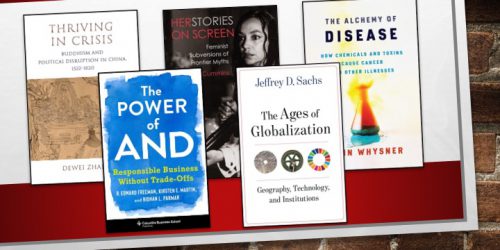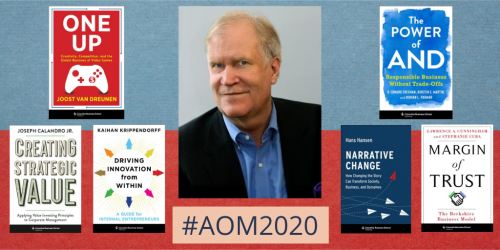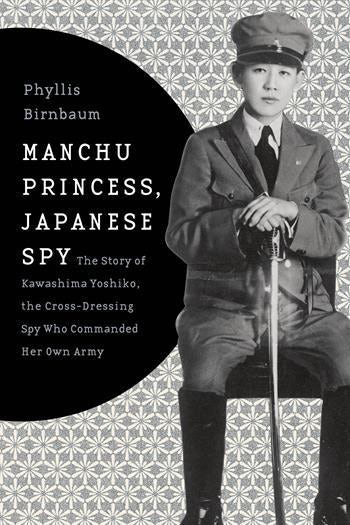Q&A: R. Edward Freeman, Kirsten E. Martin, and Bidhan L. Parmar on The Power of And

“The Power of And shows the way forward, illustrating how businesses can embed powerful purpose in their strategy, intertwining ethics and responsibility with value creation. Freeman, Martin, and Parmar weave a compelling narrative, acknowledging the complexities of organizations and people and their effect on societies.”
~Martina Hund-Mejean, former CFO of Mastercard, chair of the Mastercard Impact Fund
Our Academy of Management virtual exhibit continues today with a Q&A with R. Edward Freeman, Kirsten E. Martin, and Bidhan L. Parmar—coauthors of The Power of And: Responsible Business Without Trade-Offs. Read on to learn more and be sure to enter our drawing for a chance to win a copy of the book.
• • • • • •
In The Power of And, R. Edward Freeman, Kirsten E. Martin, and Bidhan L. Parmar identify and explore the essential components of both new and old approaches to business by recognizing the different assumptions that have given rise to the two narratives. The old business ethos is best encapsulated in Milton Friedman’s argument that the only responsibility of a business is to earn profits for its shareholders. This carried with it a family of assumptions—shareholders are the only constituency that matters; profits can be generated from a world of limitless natural wealth, and the market will always find a way to extract their value; entrepreneurs start businesses solely to make profit—that is becoming increasingly (if not entirely) outdated. Instead, the authors argue, the key relationship is between businesses and their stakeholders: groups of customers, clients, employees, and others who are intimately linked with one another and increasingly demand that social responsibility become an embedded aspect of a business. They assert that there isn’t necessarily a direct tradeoff—businesses can be profitable AND responsible with the right way of thinking.
Q: Why is the idea of purpose AND profits so hard for some people to grasp?
R. Edward Freeman: Well, as we discuss in the book, there are lots of people, both inside and outside business, both pro- and anti-business, who are very committed to the “old story of business”—the story that business exists to make money. They need that to be true.
For some business leaders, they need money to be the only purpose of business because it pares down their priorities and makes this very complicated, elaborate collaborative effort a whole lot simpler. It also justifies all sorts of short-term compromises that might otherwise be seen as unethical.
And for critics of business, if business is built solely around making money, it helps them justify the view that business cannot be trusted, must be more heavily regulated, or even that capitalism itself is irredeemable.
If you separate yourself from the old story, though, you come to realize that purpose is why you need profits—there isn’t an exchange rate between purpose and profits. It is more, “we need a profitable enterprise because we have a lot of work to do in the community,” whatever that work is. A business that believes its purpose is to make a really cool product that solves some problems at a competitive price will find itself investing in the health of its workers, will find itself involved in educating its future workforce and in making its community a safer place to operate, as well as in innovating for future products. A business that believes it exists primarily to return value to shareholders won’t necessarily do those things. There are easier ways to get to profits than to do the hard, long-term work of building a community.
Q: Why is the old story of business so powerful?
Bidhan L. Parmar: Because it allows us to believe we are good if we simply avoid scandal. And it allows us to blame business for its motives, regardless of what it does. If business is a bunch of greedy bastards trying to take your money, you are justified in doing a lot of things to protect yourself. If business, alternatively, is a group of humans who are working collaboratively to solve problems, it is harder to blame them, even when things go wrong. Business is a human institution. Things go wrong sometimes.
But we are interested in the ways that business does things right, in the ways business both structures and encourages humans to do better and be better to make a better world. It is the aggregate of those things that has really made business the most effective antipoverty institution in history.
Q: What does it mean to do business without trade-offs?
Kirsten E. Martin: The old “corporate social responsibility” model is built on the idea that business exists to make money and that if it does something besides making money—say, clean up a river in the town where its employees live—it must pay for it out of profits. There is this assumption of a trade-off between profit and a larger purpose, as if you have to pay in real dollars for your commitment to ethics.
Not so: if you have a purpose, you might find yourself spending capital or time or other resources on things besides returning value to Wall Street, because you realize that there is more that is “core” to your business than just, oh, making widgets and selling them. The health of your employees is core to your business. The water your business depends on is core to your business. The transportation system in your town gets your people to work, and so it is core to your business. Immigration policy or regulatory policy is core to your business. You can choose all kinds of investments that will help your business be more sustainable and strong for the long run. These aren’t trading profit for something that isn’t core to your business: these are investments in an expanded view of what that core is.
But if you think you are trading profits for purpose, you will get into the habit of doing whatever it takes to make shareholders happy and then directing your corporate social responsibility department to do something conspicuously charitable to atone for your bad behavior.




